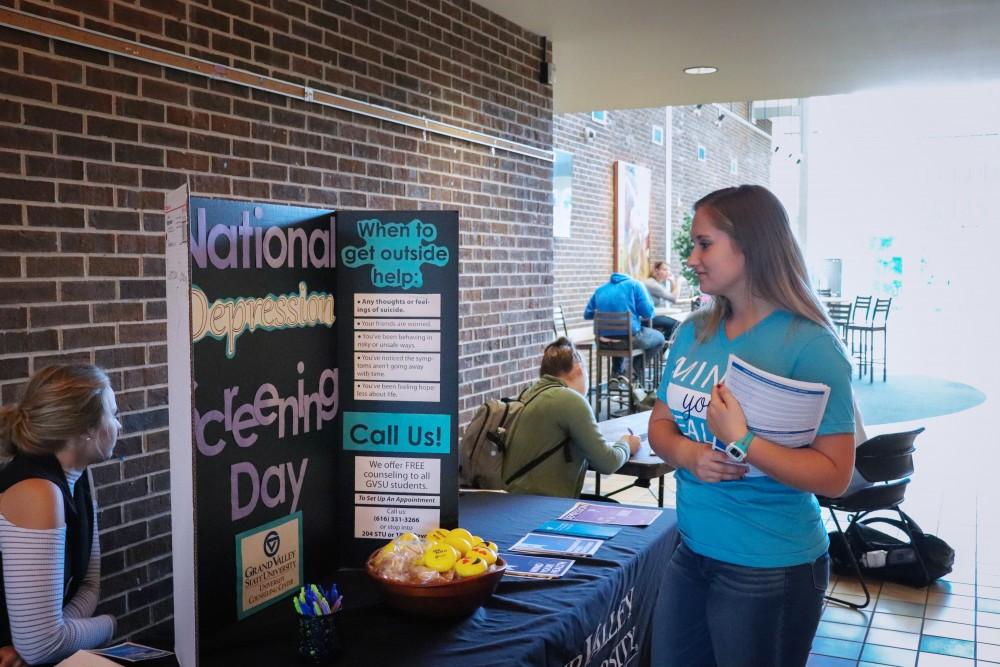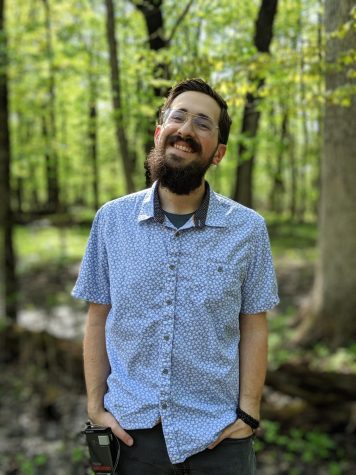National Depression Screening Day provides on-campus resources to bust mental health stigmas

National depression screening day, 10/4/2018. GVL / Katherine Vasile
Oct 8, 2018
In conjunction with National Depression Screening Day, Grand Valley State’s University Counseling Center offered students free depression screenings Thursday, Oct. 4. The screenings were offered to Allendale campus students in the Kirkhof Center and Recreation Center, as well as on the Pew campus’ DeVos Center and Cook-DeVos Center for Health Sciences.
The screenings included a questionnaire that provided students insight into their mental health. After completing the survey, students sat down with staff or trained volunteers from the University Counseling Center to go over the results.
The goal was not to diagnose students on the spot, but bring awareness to certain symptoms University Counseling. By identifying emotional traits, University Counseling Center Psychologist Nick Debernardi said that the next step is to connect students in need with specific services that the counseling center offers.
“These assessments are geared toward more symptoms, so if there are certain symptoms, that may be of concern and it may be helpful to talk to somebody,” Debernardi said. “So, we connect them with our services.”
While not every student may display traits indicative of a mental health concern, Debernardi said that the screening day also serves as an opportunity to bring awareness to the symptoms of certain mental health concerns. By adding these tools to student toolboxes, even if students can’t use the results of the screening now, they are aware of what symptoms to look out for in themselves and in their peers.
“These questions can be helpful to know,” Debernardi said. “Maybe you’re not struggling now, or maybe down the road you’ll just have that awareness and it’s more preventative. And if you’re thinking this way or feeling this way, you can come talk to us.”
With that consideration for the future, there are hopes that students take the insight gained from the screenings and apply it wherever they go. Because of the University Counseling Center’s focus on helping students through college and providing the tools for them to feel comfortable after, Debernardi said that National Depression Screening Day is another way to spread their message.
“Our primary focus is helping these students succeed in school,” Debernardi said. “There are a lot of things that can be barriers to that, so mental health is very important to getting through this process. However, with that said, being a successful ‘Laker for a Lifetime’ is very important. So, the idea of these screenings [is] if we can get out there and have a discussion and they’re aware of it, maybe after they graduate, they’re aware of if these feeling are there.
Aside from the results of the screening, Debernardi said that the other goal of the event is to take members from the counseling center out of the office and to have interactions with students. While improving, there is still a stigma surrounding mental health. By creating opportunities for professionals to debunk a lot of assumptions and have conversations with students, these events slowly break down that stigma.
“The more we can get out and have honest conversations about this, the more helpful we can be,” Debernardi said. “I think there are good reasons for stigma in history, so I do believe there still is a stigma in our culture. And I do believe that these honest conversations, (being) open and out there around the students can help that.”
Included in mental health assumptions is the notion that students only go to therapy because of mental health disorders. Debernardi said he hopes that the event makes it clear that students can show symptoms of mental health concern because of either a single bad day or a long-term struggle. Regardless, the University Counseling Center’s goal is to be there for any student who needs their help.
“[I believe in] the message of we’re here to help with whatever situation,” Debernardi said. “A lot of people believe you just come to counseling, to therapy because of major things going on in life, but I think the idea of wherever somebody is at and whatever concerns there may be, we’re here to support them.”
























